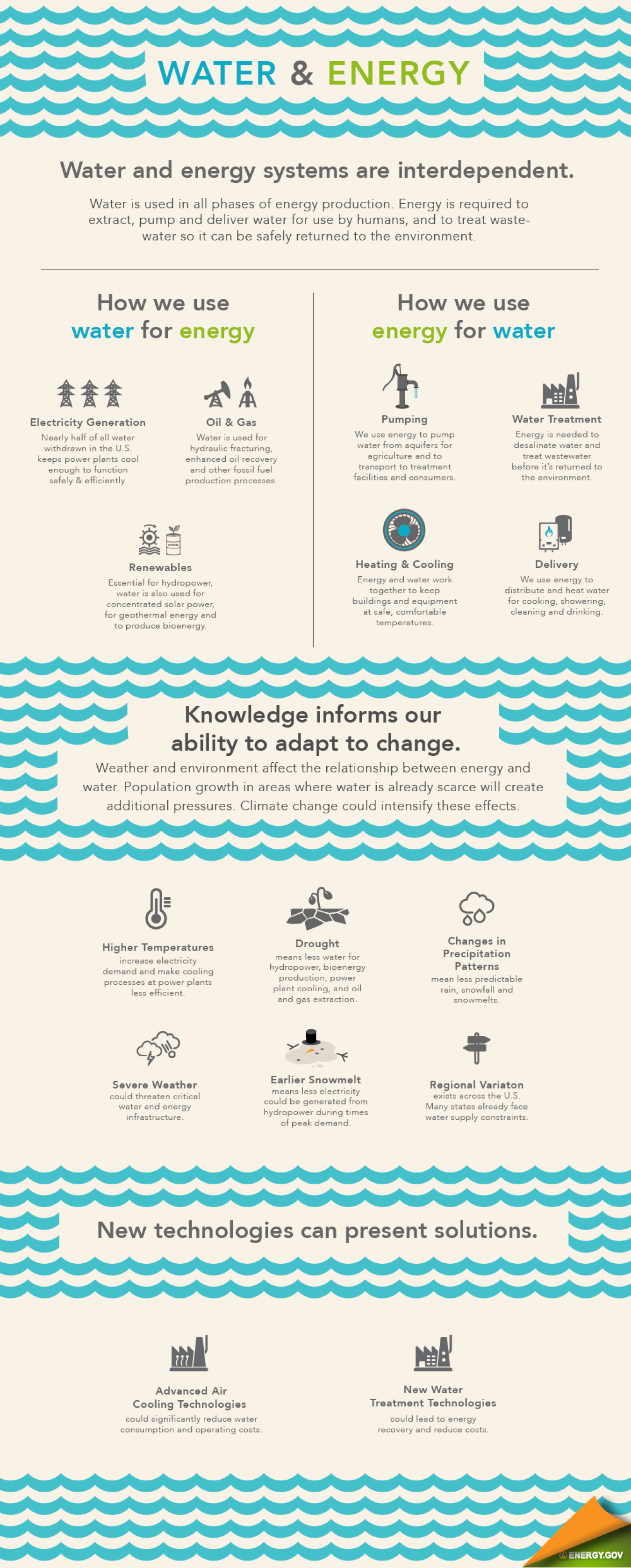A new report explores the interdependencies between our water and energy systems, framing the challenges and opportunities ahead for the Energy Department and our partners.
June 18, 2014
Infographic by <a href="/node/379579">Sarah Gerrity</a>, Energy Department.
As the Energy Department pursues our important mission areas of climate change, energy security and environmental responsibility, we must take into account dynamic interactions among our energy system, the population, the economy, other infrastructure systems and natural resources. One crucial interaction is that between our present-day energy and water systems.
The Energy Department’s new report -- The Water-Energy Nexus: Challenges and Opportunities -- examines this interaction, and lays out several technical and operational challenges at local, regional and national scales. The report notes that water scarcity, variability and uncertainty are becoming more prevalent, potentially leading to vulnerabilities within the U.S. energy system. Changes brought on by population growth, technological advances and policy developments are increasing the urgency for informed action.
The interdependencies between our water and energy systems are clear -- and becoming more prominent. Water is used in all phases of energy production and electricity generation, and energy is required to extract, convey and deliver water and to treat wastewaters prior to their return to the environment. When severe drought affected more than a third of the United States in 2012, limited water availability constrained the operation of some power plants and other energy production infrastructure. When Hurricane Sandy struck that same year, we saw firsthand the major problems that arise when vital water infrastructure and facilities lose power. And the recent boom in domestic unconventional oil and gas development, brought on by hydraulic fracturing and horizontal drilling, has added complexity to the national dialogue about the relationship between energy and water resources.
What’s more, the effects of climate change only amplify the need to manage our interdependent water and energy systems more mindfully. As the release of the third U.S. National Climate Assessment made clear last month, climate change is affecting every region of the United States and key sectors across our economy. Even as the Energy Department is taking strong steps to cut carbon pollution and work with our international partners to build a more sustainable energy future, we must prepare for the effects of climate change we are already seeing.
The Energy Department’s longstanding leadership in modeling and technology research and development makes it uniquely suited to meet the national need for data-driven and empirical solutions to address these challenges. This report is just the beginning. The Department of Energy looks forward to working with our partners, including other federal agencies, state and local governments, members of Congress, foreign governments, private industry, academic institutions, non-governmental organizations, and citizens, to develop and pursue a shared vision of more resilient coupled energy-water systems. This integration and collaboration will enable more effective research, development and deployment of key technologies, harmonization of policies where warranted, shared datasets, informed decision-making, and robust public dialogue.
A key part of that dialogue is our ongoing meetings to gather public comment on the Quadrennial Energy Review (QER), a four-year process to identify key threats, risks and opportunities for U.S. energy and climate security. Tomorrow in San Francisco, Dr. John Holdren -- Director of the White House Office of Science and Technology Policy -- will lead a discussion with regional stakeholders about the water-energy nexus and lessons learned that could be applied broadly across this issue area. Future opportunities to provide input to the QER process remain.
To learn more about the interdependencies between our water and energy systems, and trends that affect them both, explore the infographic above.
Dr. Ernest Moniz
Download high-resolution portraits
Dr. Ernest Moniz served as United States Secretary of Energy from May 21, 2013 to January 19, 2017. As Secretary of Energy, he was tasked with implementing critical Department of Energy missions in support of President Obama’s goals of growing the economy, enhancing security and protecting the environment. This encompassed advancing the President’s all-of-the-above energy strategy, maintaining the nuclear deterrent and reducing the nuclear danger, promoting American leadership in science and clean energy technology innovation, cleaning up the legacy of the cold war, and strengthening management and performance.
Prior to his appointment, Dr. Moniz was the Cecil and Ida Green Professor of Physics and Engineering Systems at the Massachusetts Institute of Technology (MIT), where he was a faculty member since 1973. At MIT, he headed the Department of Physics and the Bates Linear Accelerator Center. Most recently, Dr. Moniz served as the founding Director of the MIT Energy Initiative and as Director of the MIT Laboratory for Energy and the Environment where he was a leader of multidisciplinary technology and policy studies on the future of nuclear power, coal, nuclear fuel cycles, natural gas and solar energy in a low-carbon world.
From 1997 until January 2001, Dr. Moniz served as Under Secretary of the Department of Energy. He was responsible for overseeing the Department’s science and energy programs, leading a comprehensive review of nuclear weapons stockpile stewardship, and serving as the Secretary’s special negotiator for the disposition of Russian nuclear materials. From 1995 to 1997, he served as Associate Director for Science in the Office of Science and Technology Policy in the Executive Office of the President.
In addition to his work at MIT, the White House and the Department of Energy, Dr. Moniz has served on a number of boards of directors and commissions involving science, energy and security. These include President Obama’s Council of Advisors on Science and Technology, the Department of Defense Threat Reduction Advisory Committee, and the Blue Ribbon Commission on America’s Nuclear Future.
A member of the Council on Foreign Relations, Dr. Moniz is a Fellow of the American Association for the Advancement of Science, the American Academy of Arts and Sciences, the Humboldt Foundation, and the American Physical Society.
Dr. Moniz received a Bachelor of Science degree summa cum laude in Physics from Boston College, a Doctorate in Theoretical Physics from Stanford University, and honorary degrees from the University of Athens, Boston College, Boston University, the University of Erlangen-Nurenberg, Iowa State University, University of Massachusetts Dartmouth, Michigan State University and Universidad Pontificia de Comillas. He has been awarded the Distinguished Public Service Medal of the Department of Defense, and the Grand Cross of the Order of Prince Henry the Navigator.



